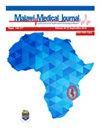绝经期症状和绝经期生活质量与经前综合征的关系
IF 0.8
4区 医学
Q4 PUBLIC, ENVIRONMENTAL & OCCUPATIONAL HEALTH
引用次数: 0
摘要
育龄期经前症状与绝经期症状相似,具有症状共性。我们假设先前有经前综合征的妇女可能更容易出现绝经期症状,目的是调查绝经期症状和绝经期生活质量与经前症状的关系。方法研究对象为120名绝经后妇女。我们用绝经评定量表(MRS)评估当前绝经期症状,用绝经特异性生活质量量表(MSQoL)评估生活质量,用经前综合征量表(PMSS)评估既往经前症状,并对其相关性进行统计学比较。结果根据回顾性PMSS量表,受试者分为两组;有或没有经前综合症(PMS)经前综合征组29例(24.2%),非经前综合征组91例(75.8%)。各组的社会人口学特征相似。经前症候群患者的躯体和心理症状明显高于经前症候群。评估MSQoL;经前综合症组的心理社会和生理症状受损。两组患者血管舒缩、泌尿生殖和性症状相似。结论经前和绝经期症状与躯体和社会心理症状相关,而与血管舒缩、泌尿生殖和性症状无关。在某些方面,似乎有过经前症状的女性更有可能出现更年期症状。然而,一个前瞻性的纵向研究可能需要更结论性的结果。本文章由计算机程序翻译,如有差异,请以英文原文为准。
Association of menopausal symptoms and menopausal quality of life with premenstrual syndrome
BackgroundPremenstrual symptoms at reproductive age resemble menopausal symptoms and have symptomatic commonalities. We hypothesized that women with previous premenstrual syndrome may be more prone to develop menopausal symptoms and aimed to investigate the association of menopausal symptoms and menopausal quality of life with premenstrual symptoms. MethodsThe study included 120 postmenopausal women. We evaluated the current menopausal symptoms with menopause rating scale (MRS) and quality of life with menopause-specific quality of life scale (MSQoL), previous premenstrual symptoms with premenstrual syndrome scale (PMSS) retrospectively and compared the associations statistically. ResultsAccording to retrospective PMSS, participants were divided into two groups; with and without premenstrual syndrome (PMS). PMS group included 29 (24.2%) participants and 91 (75.8%) participants were in group without PMS. Sociodemographic characteristics of groups were similar. Somatic and psychological symptoms were higher in MRS of PMS group. Evaluating the MSQoL; psychosocial and physical symptoms were impaired in the PMS group. Vasomotor, urogenital and sexual symptoms were similar in both groups. ConclusionPremenstrual and menopausal symptoms were related in terms of somatic, and psychosocial symptoms but not in vasomotor, urogenital, and sexual symptoms. It seems that women with previous premenstrual symptoms are more likely to develop menopausal symptoms in some ways. However, a prospective longitudinal study may be needed for more conclusive results.
求助全文
通过发布文献求助,成功后即可免费获取论文全文。
去求助
来源期刊

Malawi Medical Journal
Medicine-General Medicine
CiteScore
1.50
自引率
0.00%
发文量
27
审稿时长
>12 weeks
期刊介绍:
Driven and guided by the priorities articulated in the Malawi National Health Research Agenda, the Malawi Medical Journal publishes original research, short reports, case reports, viewpoints, insightful editorials and commentaries that are of high quality, informative and applicable to the Malawian and sub-Saharan Africa regions. Our particular interest is to publish evidence-based research that impacts and informs national health policies and medical practice in Malawi and the broader region.
Topics covered in the journal include, but are not limited to:
- Communicable diseases (HIV and AIDS, Malaria, TB, etc.)
- Non-communicable diseases (Cardiovascular diseases, cancer, diabetes, etc.)
- Sexual and Reproductive Health (Adolescent health, education, pregnancy and abortion, STDs and HIV and AIDS, etc.)
- Mental health
- Environmental health
- Nutrition
- Health systems and health policy (Leadership, ethics, and governance)
- Community systems strengthening research
- Injury, trauma, and surgical disorders
 求助内容:
求助内容: 应助结果提醒方式:
应助结果提醒方式:


